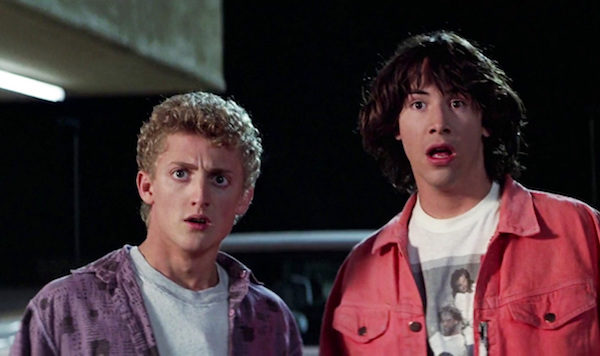Learning Morality from Bill and Ted
by Brandon Vogt
Filed under Christianity and Science, Morality

Early in this review series, I mentioned how Sean Carroll's new book, The Big Picture: On the Origins of Life, Meaning, and the Universe Itself (Dutton, 2016), gradually becomes weaker as you move through the chapters. It starts off strong and invigorating as he talks about cosmology and fundamental physics, his specialities. But as he moves into the philosophy of mind, meaning, and morality, he gets a bit wobbly.
Moving From Ought to Is
That's evident especially in his chapter on "What Is and What Ought To Be." The chapter starts off fine. Carroll agrees with David Hume, the famous skeptic whom Carroll deems a "forefather of poetic naturalism", that we can never derive an "ought" from an "is." In other words, we can never take a description of the world (how the world is) and logically deduce a prescription (how we ought to behave in response.) Why? Because for naturalists like Carroll and Hume, "is" is all there is. There's nothing outside the natural world to tell us how we ought to behave in response to the natural world. But maybe the natural world itself can offer guidance? Unfortunately no, says Carroll. He writes, "The natural world doesn't pass judgment; it doesn't provide guidance; it doesn't know or care about what ought to happen" (396).Some atheists disagree, such as Sam Harris. Harris tries to defend objective morality on scientific grounds, suggesting that moral acts ("oughts") are those which bring about the flourishing of sentient creatures. In other words, we ought to do things that bring about the most flourishing. And on this view, it's true that science can tell us what brings about the most flourishing (at least some types of flourishing, that is.) But bracketing the vaguely defined concept of "flourishing" (who decides what counts as flourishing?) the big problem with Harris' view is the hidden premise that we ought to prefer and promote the flourishing of sentient creatures. On what authority does this rest? Is it an objective principle or just Harris' personal belief, one that many people may share, but not all?
Science can only provide us guidance about what to do if we want to attain a specific goal (e.g., sentient flourishing). But science can never reveal moral values or duties suggesting we ought to pursue those specific goals. This is a major reason why Harris' proposal fails.
Carroll understands all of this. He denies that morality can be grounded within science. However, he does think we can discover moral duties using the "tools of reason and rationality" (401).
“Be Excellent to Each Other”
Here's where things get a little wonky. Strangely, Carroll quotes (approvingly) a moral axiom from the 1989 cult classic, Bill and Ted's Excellent Adventure: "Be excellent to each other." Carroll writes, "As foundational precepts for moral theorizing go, you could do worse" (402). But not much, I would add. It's not clear who determines what "excellent" means. Is abortion excellent? Is murdering one person to save five more excellent? Is it excellent to leave your spouse if you find a more appealing partner?Another problem with the Bill and Ted morality is why we should obey it. Even if we determined precisely what excellent behavior entails, why should pursue this standard of excellence? Who or what says we ought to follow this axiom? Whether it's Bill, Ted, or Sean Carroll, why should we follow their moral beliefs?
Although Carroll perhaps quoted this line as a joke—though I don't think he did, given his commentary above—it displays the same problems that Hume identified over a century ago.
Other Moral Theories
Throughout the chapter, Carroll surveys several other moral theories, seeming to settle on a form of moral relativism. He says:"Hume was right. We have no objective guidance on how to distinguish right from wrong: not from God, not from nature, not from the pure force of reason itself....Morality exists only insofar as we make it so, and other people might not pass judgments in the same way we do." (411)
Many people would find this conclusion troubling, and Carroll doesn't shy away from its implications:
"The lack of an ultimate objective scientific grounding for morality can be worrisome. It implies that people with whom we have moral disagreements—whether it's Hitler, the Taliban, or schoolyard bullies who beat up smaller children—aren't wrong in the same sense that it's wrong to deny Darwinian evolution or the expansion of the universe....But that's how the world is." (402)
This chilling quote suggests that Carroll does not believe Hitler or the Taliban were objectively wrong in their actions. It seems he just personally disagrees with their actions because has has a different opinion of how to "be excellent". Moral relativists like Carroll have no objective basis to condemn obviously immoral acts like the Holocaust or 9/11. They're only left with strongly felt and loudly expressed opinions.
A More Judgemental Moral Relativist
It's worth noting Carroll's contention that poetic naturalists are not moral relativists, but instead moral constructivists. The primary difference, according to Carroll, is that relativists don't feel enabled to critically judge the moral decisions of others (especially those deriving from other cultures), whereas constructivists are perfectly happy to do so, even while admitting their moral frameworks are only attempts to systematize their own personal/cultural intuitions about how to act.But in my mind, this doesn't separate moral constructivism from moral relativism; it just makes the moral constructivist a type of moral relativist. He's still a relativist, but one that is just more judgmental and critical than other relativists.
It's also worth noting that despite examining several different moral theories in his book, from constructivism, to instrumentalism, to consequentialism, to virtue-ethics, to utilitarianism, Carroll never gives serious consideration to the theistic view. He never considers God to be the objective ground of morality. This is likely because Carroll presumes poetic naturalism is true, and thereby precludes God from the outset.
But that would only enforce my earlier criticism, that Carroll's cosmic picture is not big, as his book title suggests, but is in fact too small. In his moral exploration, he fails to find a satisfying answer in part because he needlessly restricts his pool of options!
In the next post we'll wrap up this series with a look at Sean Carroll's “Ten Considerations” for naturalists. Stay tuned!
Related Posts
Note: Our goal is to cultivate serious and respectful dialogue. While it's OK to disagree—even encouraged!—any snarky, offensive, or off-topic comments will be deleted. Before commenting please read the Commenting Rules and Tips. If you're having trouble commenting, read the Commenting Instructions.












